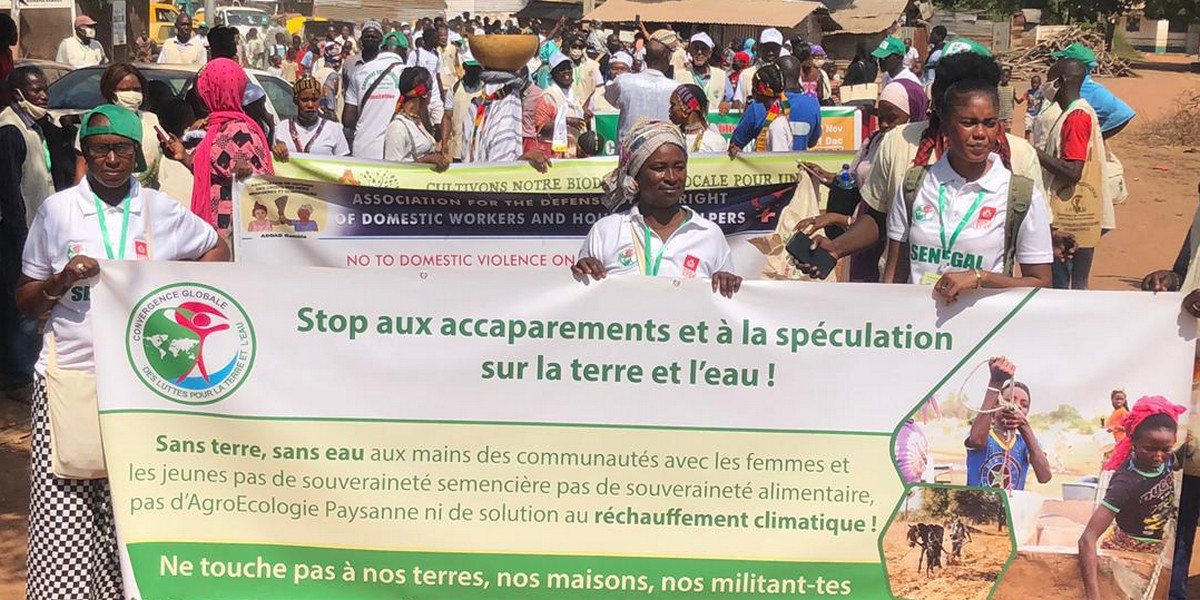From 20 November to 11 December 2021, the third edition of the caravan of the West African Global Convergence for land, water and seed struggles (GCLTE-AO) travelled across five different countries in West Africa (Gambia, Senegal, Guinea Bissau, Guinea Conakry and Sierra Leone). This bi-annual event, led by a regional coalition of civil society organisations, faith-based actors and social movements, aims to support and bring together communities that are resisting the grabbing of their natural resources and the systematic human rights violations it causes. During the caravan, participants share their stories and struggles with each other and interact with government officials, traditional and religious leaders to make their voices heard.
In the Gambia, where the journey started, the caravan was hosted by the National Coordinating Organisation of Farmer Associations the Gambia (NACOFAG). This is a network of farmers and producer associations of the Gambia working on the themes of good governance, advocacy and lobbying.
In this blog contribution, Burry Tunkara, Assistant Programme Officer at NACOFAG and President of ADDAD Gambia, looks at the Caravan from the perspective of women farmers and their struggles for land rights.
The caravan & women farmers struggles for land rights
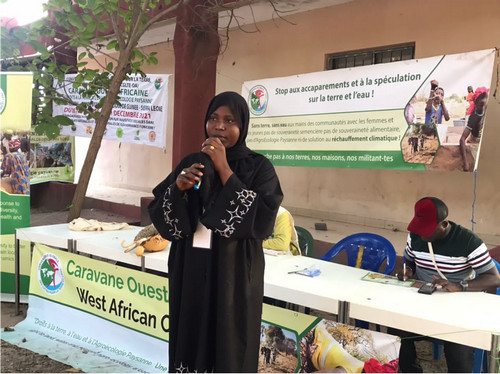
The third edition of the caravan of the Global Convergence for land, water and seed struggles was well attended. It mobilised over 200 participants, 60 to 70 percent of which were women and young people from different sectors, including food producers, livestock growers, traditional and religious leaders, civil society organisations, and social movements. It also attracted the attention of many people, particularly women, who are actively involved in agriculture.
For me, it was the second time that I participated in the caravan. The first time was in 2018 when I was one of two delegates from the Gambia who participated through the NACOFAG platform. I was able to share with and listen to experiences of different people in different countries and met many women farmers who struggle to get access to land in their community. This experience motivated me and my colleagues at NACOFAG so much that we got actively engaged in the preparation and logistics of the third edition of the Caravan, which was launched in the Gambia.
The struggles of women farmers to access land are critical. In developing countries, women are responsible for approximately 70% of food production, particularly in West Africa and many women depend on farming for their survival. They work very hard to support their community and to create an environment where their children have access to education and their social needs are met. Yet, they still find it very difficult to own a piece of land in their community. In some communities, women have less or no rights when it comes to land ownership. In search for a decent job to survive and take care of their children, women often feel compelled to migrate from country to country or from rural areas to urban centres.
No to social injustice around land rights for women farmers
Social injustice is rampant in our society, particularly for women. Some of these social injustices are empowered by cultural norms and values, which silence women and force them to obey to anything decided by men and elders. They also make it impossible for women to inherit their husband’s or family’s land. This is utterly unjust because in many cases women are the bread-winners in their families and are taking the lead in caring and catering from the entire family. Many women have also had their lands and properties taken without compensation.
During the caravan, I heard one story that particularly touched me. It was the story of Alasan and his mother, who broke the ‘culture of silence’ by sharing their struggles with us. Alasan, a 13-year-old boy, and his mother experienced many social injustices after the death of his father, who had always provided financial stability and had property in his name. After his death, however, his family denied his wife and children access to this property. From her story I learnt that the case was even taken to court as she wanted justice for herself and her children. However, she lost the case and said, ‘it must be because I am a woman or because I have no family to stand up for me at this level’. For Alasan, it is incredibly hard to see his mother suffer and as she has no possibility to pay for this school fees, he had to go find a job, despite the responsibilities and dangers that this bring with.
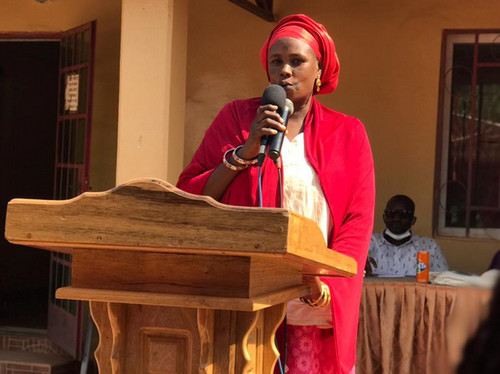
This is only one of many stories as struggles for land and other natural resources are a key concern for all women involved in the caravan. The caravan has been a great opportunity for them to speak out; raise awareness and advocate for land, water and seeds, and be actively engaged in action for social and environmental justice. In doing so, they were able to enter into dialogue with government authorities, traditional and religious leaders, asking them to contribute to women’s empowerment in the agricultural sector by ensuring their access to land and other natural resources. They urged them to consider their struggles and to be included in decision-making from the grass-roots.
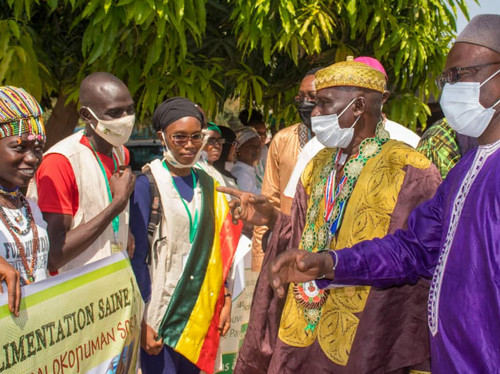
Involvement of local chiefs in supporting land rights
Chief Dawda York, a local chief of the Nianija district in the Gambia, was directly involved in the caravan. For him, it was a great pleasure to be part of this movement that empowers farmers, especially women farmers, in their farming activities and in securing land, water and seeds for agricultural production. Speaking on behalf of all the chiefs in the Gambia, he recognised that, while for most women the main occupation is farming, they still cannot have/own their own land. This ownership, however, is crucial as it would enable them to do commercial farming, which provides more opportunities than subsistence farming. This is because most women do gardening in their residence or backyard to cultivate vegetables for consumption only.
In various cases, he, as a local chief, had already supported women in securing land for farming. The Global Convergence Movement for Land, Water and Seeds struggles inspired him and made him more aware about the struggles that women farmers face. This awareness was shared with other chiefs, which led them to attend various platforms in different African countries whose activities are centered on women farmers, on securing ownership to land and on increased participation in decision-making. These activities, including seminars and campaigns, motivated him to support over 130 women in his district to secure and own land for farming and other agricultural activities.
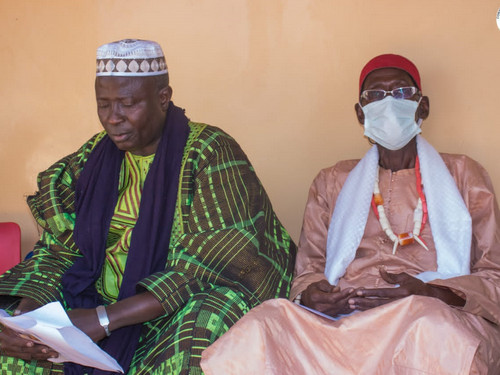
Gaining confidence to fight for rights
The Green Book of the CGLTE, which is the advocacy document that articulates the demands of communities, highlights that “the future is in the hands of women”, who should be leaders in our transition to sustainable agricultural and food systems. In most cases, they constitute the majority of the agricultural community. Therefore, supporting them in acquiring land and empowering them to carry out their activities is crucial. This includes good land governance practices and omitting unfavorable cultural norms and values that hinder women’s empowerment.
Thanks to the caravan and the Global Convergence Movement for Land, Water and Seed struggles West Africa, the women who participated gained the confidence to fight for their rights to natural resources. They called upon government authorities and traditional and religious leaders to intervene and to provide favorable land policies and good land governance to enable women farmers to access and own land.
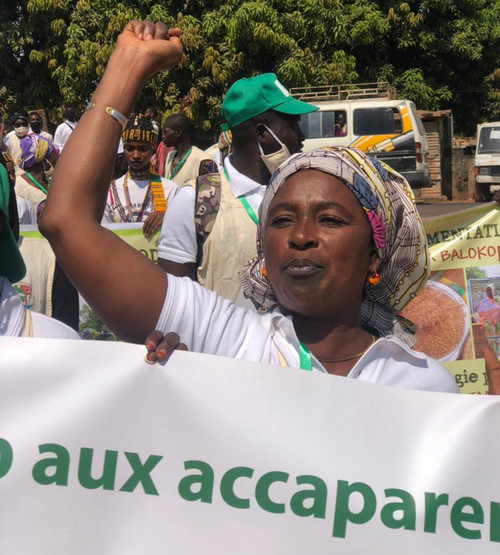
Photo credits: West African Global Convergence for land, water and seed struggles (GCLTE-AO) and ADDAD Gambia.

